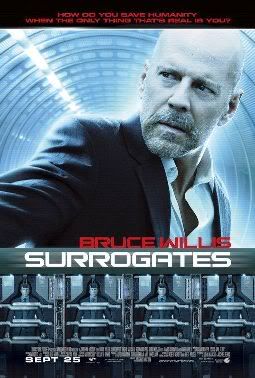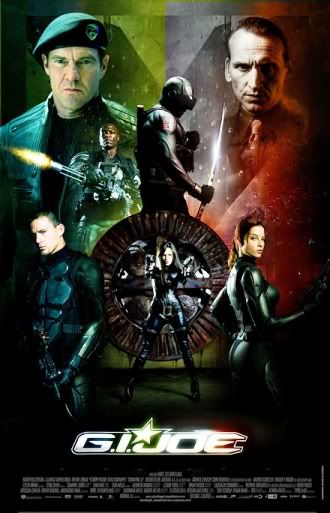There's a certain kind of excitement that washes over me whenever I read about a sci-fi movie which deals in a particularly heady subject. For me, good, well thought out sci-fi is one of the best things in the world. The worlds they present, the questions they pose, the conversations they spark; well-made science fiction can get my friends and I to argue and discuss and think about life's smallest issues as well as its grandest controversies. At the same time, there's a certain kind of disappointment when a film with such promise squanders all of its potential. Jonathan Mostow's Surrogates is just such a film.
The film presents a near-future in which 99 percent of the world's population (think on THAT one for a few minutes) operate robotic avatars from the safety of their own homes. The robots look like flawless humans; physically superior versions of our fragile, ugly selves. When the son of the surrogates' inventor is murdered through his surrogate, detective Tom Greer (Bruce Willis) is called on to find the killer. Have I killed your interest yet? Because this is precisely where I started tuning out. Such a fantastic concept is given a backseat to a standard, run-of-the-mill murder mystery.
This wouldn't be such a big problem if the murder mystery weren't so completely labyrinthine. In any other movie, it would be fairly straightforward. With the presence of surrogates that anyone can swap out at any time, it becomes increasingly difficult to keep track which person is controlling which robot. And then when you throw in red herrings and other typical murder mystery cliches, it all makes Surrogates more complicated than it needs to be, and less interesting than it ought to be. Add to this the fact that the because movie isn't even 90 minutes long, there's little time for the movie to settle into any kind of rhythm, let alone explain itself clearly.
For what it's worth, the practical and CG effects for the actual surrogates is pretty top-notch. In his robot form, Bruce Willis looks younger than he has in decades, which admittedly was the point, but it's offset by a hairpiece that's pretty laughable. Other actors and their robo-selves come off better though (Rosamund Pike in particular), and on a purely basic level, the concept works.
Surrogates probably would've played better during the summer months where audiences might have been more willing to shut their brains off and enjoy the ride. As it stands, the movie washes over you and seems to dare you to try and analyze it. Instead, it squanders its massive potential in favor of exploring territory that was already effectively mined in I, Robot. It's not really a bad film, but it could have been so much more. In some ways, I think that makes Surrogates even worse.
2 (

 ) stars out of five.
) stars out of five.



